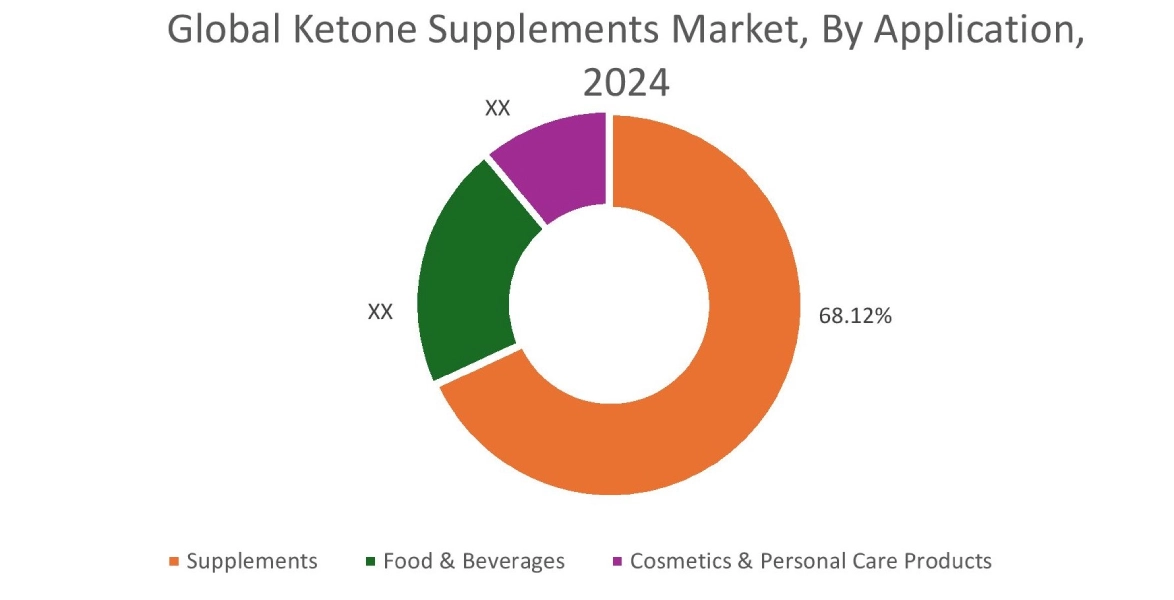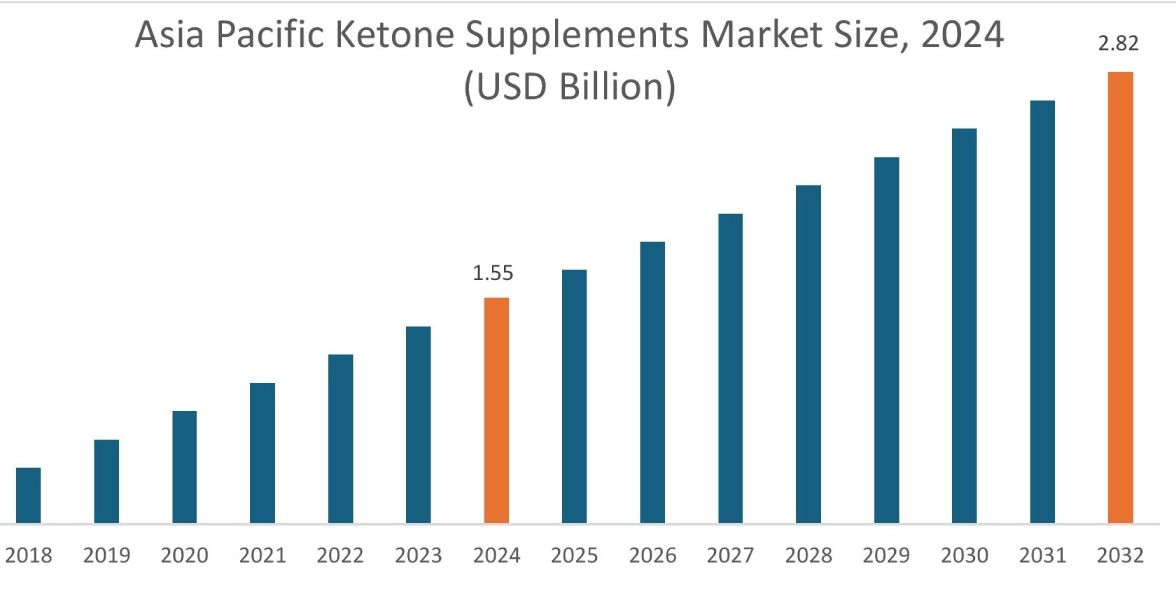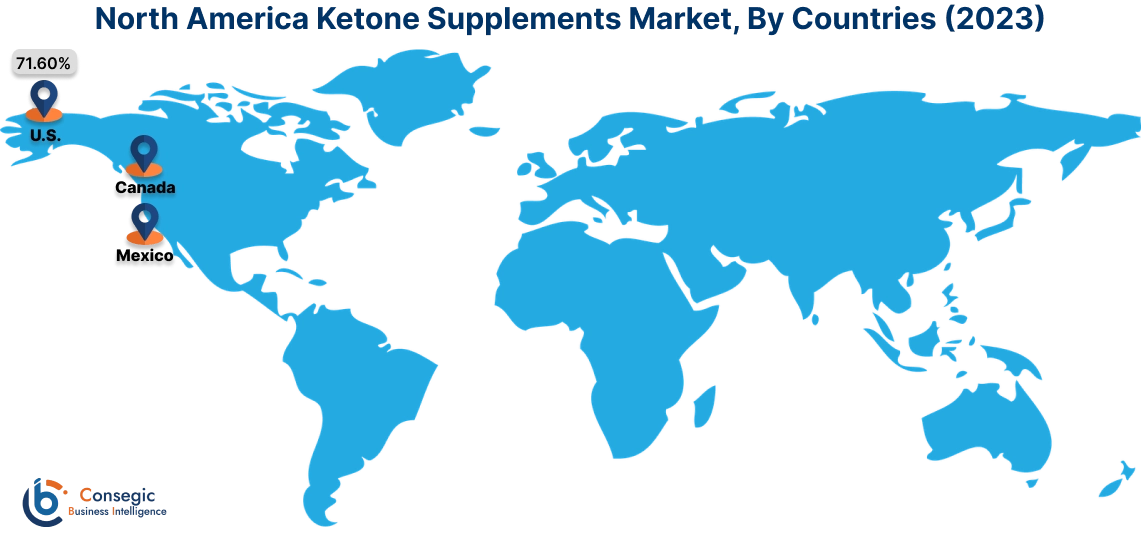Ketone Supplements Market Size:
Ketone Supplements Market Size is estimated to reach over USD 10.84 Billion by 2032 from a value of USD 6.25 Billion in 2024 and is projected to grow by USD 6.60 Billion in 2025, growing at a CAGR of 6.4% from 2025 to 2032.
Ketone Supplements Market Scope & Overview:
Ketone supplements are dietary products that aim to increase ketone levels in the body, typically through the ingestion of exogenous ketones. These supplements are designed to mimic the metabolic state of ketosis, where the body utilizes ketones, produced from fat, as an energy source instead of glucose. They are available in various forms, such as ketone salts and ketone esters, and are often marketed for potential benefits like improved athletic performance, enhanced cognitive function, and support during low-carbohydrate diets.
Key Drivers:
Rising popularity of the ketogenic diet is driving the ketone supplements market expansion
Ketone supplement is becoming increasingly popular due to the growing interest in ketogenic diets. These diets, characterized by their low-carb and high-fat composition, encourage the body to enter ketosis, a metabolic state where fat, rather than carbohydrates, becomes the main energy source. The supplements, such as ketone esters and salts, speed up the body's entry into ketosis and help maintain it. Consequently, they are widely used by individuals aiming for weight loss and better metabolic health.
The growing trend of incorporating supplements into personalized health regimens highlights their potential to contribute to long-term wellness. Market analysis depicts that their ability to address both weight management and energy optimization makes them a valuable addition to the overall health and nutrition landscape.
- For instance, in November 2022, Genomatica Inc. launched Avela natural (R)-1,3-Butanediol, a new sugar-free functional ingredient designed for the functional food and beverage market. This innovative product provides a fast, simple, and convenient method to increase levels of beta-hydroxybutyrate (BHB) ketone, which is the main fuel a body produces when in a state of ketosis.
Thus, according to the ketone supplements market analysis, the rising popularity of the ketogenic diet is driving the ketone supplements market size and growth.
Key Restraints :
High cost of supplements is affecting the ketone supplements market demand
The premium pricing of these supplements may limit their adoption among price-sensitive consumers. Additionally, the market is subject to stringent regulations and quality standards, which can pose challenges for manufacturers. Further, compliance with these regulations requires significant investment in research, testing, and certification, which can impact profit margins. Hence, the aforementioned factors would further impact the ketone supplements market size.
Future Opportunities :
Growing interest in sports nutrition and cognitive health is expected to drive the ketone supplements market opportunities
The rising number of athletes and fitness enthusiasts seeking performance-enhancing supplements opens up new avenues for supplement manufacturers. Additionally, the increasing focus on cognitive health and mental performance among students, professionals, and older adults presents a lucrative market segment. The development of targeted marketing strategies and product formulations can help companies capitalize on these prospects.
Further, research indicates that ketones can also provide neuroprotective benefits by decreasing oxidative stress and inflammation in the brain. These properties are particularly relevant in the context of neurodegenerative conditions like Alzheimer's disease, where impaired glucose metabolism in the brain is observed.
- For instance, in 2023, Ketone Aid introduced its latest product, KetoneAid KE4 Pro, which focuses on enhancing athletic performance and cognitive function. The company also expanded its distribution network to reach a broader consumer base in North America.
Thus, based on the above ketone supplements market analysis, the growing interest in sports nutrition and cognitive health is expected to drive the ketone supplements market opportunities.
Ketone Supplements Market Segmental Analysis :
By Product Type:
Based on product type, the ketone supplements market is segmented into tablets & capsules, powder, gummies, and liquid.
Trends in the product type:
- The versatility of ketone oils, which can be incorporated into various food and beverage products, has broadened their application scope.
- Ketoacid tablets focus on enhancing the body's ability to enter and maintain ketosis, thereby promoting sustained energy and cognitive function. As the market continues to evolve, the introduction of such advanced products highlights the ongoing commitment to meeting consumer needs for effective and accessible ketogenic solutions.
- Thus, these factors are driving the ketone supplements market demand.
The powder segment accounted for the largest revenue share in the year 2024.
- Powdered forms are highly versatile, easily mixable into water, smoothies, coffee, or even incorporated into baked goods. This ease of use appeals to a broad demographic looking for practical ways to integrate ketones into their daily routines.
- There is a growing emphasis on powders for endurance, glycogen sparing, and post-exercise recovery, including muscle protein synthesis and anti-inflammatory effects.
- The development of more stable and palatable ketone powders facilitates their incorporation into a wider range of functional food and beverage products, moving beyond traditional dietary supplements.
- Thus, based on the above analysis, these factors are further driving the ketone supplements market growth.
The gummies segment is anticipated to register the fastest CAGR during the forecast period.
- Ketone gummies are highly visible and accessible through online retail platforms, which offer a wide variety of brands and competitive pricing.
- Ketone gummies are increasingly prevalent in the supplements market, primarily due to their user-friendly format, ease of transport, and improved taste profiles.
- This makes them a highly attractive option for consumers seeking the benefits of ketones without the often-unpleasant flavor or mixing requirements of powders and liquids.
- Thus, based on the above analysis, these factors are expected to drive the ketone supplements market share during the forecast period.
By Application:
Based on the application, the ketone supplements market is segmented into supplements, food & beverages, and cosmetics & personal care products.
Trends in the application:
- The growing endorsements and usage by professional athletes have significantly contributed to the adoption of ketone supplement.
- The increasing global demand for sustainable products is driving a shift towards natural ingredients in the cosmetics and personal care industry.
The supplements segment accounted for the largest revenue share of 68.12% in the year 2024.
- Supplements are widely adopted in health and wellness practices, valued for their contributions to weight management, boosting energy levels, and improving cognitive function.
- The increasing embrace of ketogenic diets, primarily for metabolic health and fitness goals, is fueling the development of the supplements segment in the industry.
- Moreover, the expanding number of health-conscious consumers worldwide has increased the need for dietary supplements that offer multifaceted health benefits.
- Additionally, innovations in product formulations and introduction of new delivery forms, such as capsules and powders, have made supplements more accessible and appealing to a broader audience.
- Thus, based on the above analysis, these factors would further supplement the ketone supplements market
The food & beverages segment is anticipated to register the fastest CAGR during the forecast period.
- Modern consumers lead busy lives and seek quick, easy solutions. Ketone-infused food and beverages perfectly fit this need, offering functional benefits without meal preparation or complex mixing.
- Moreover, the broader trend towards functional foods (products offering health benefits beyond basic nutrition) provides a lucrative prospect for ketone integration.
- Further, the increased availability in mainstream grocery stores, convenience stores, online retailers, and even cafes makes ketone-infused products more accessible to the general public, moving beyond niche health food stores.
- Thus, based on the above analysis, these factors are anticipated to further drive the ketone supplements market trends during the forecast period.

By Distribution Channel:
Based on distribution channel, the market is segmented into hypermarkets/supermarkets, convenience stores, specialist stores, online retail, and others.
Trends in the distribution channel:
- Fitness centers and gyms are increasingly partnering with ketone supplement brands to offer products to their members, leveraging the growing interest in sports nutrition.
- Supermarkets and hypermarkets are significant distribution channels due to their extensive reach and growing consumer preference for one-stop shopping destinations. These stores offer a variety of ketone supplements, providing consumers with the opportunity to physically examine products before purchase. Consequently, the above factors are driving the global market trends.
The online retail segment accounted for the largest revenue share in the year 2024.
- Online stores constitute the largest distribution channel, driven by the growing trend of e-commerce and increased convenience of online shopping.
- Moreover, consumers prefer online stores for their wide product range, competitive pricing, and ease of comparing different brands and products.
- In addition, the availability of customer reviews and detailed product information further supports the growth of this channel.
- Thus, the aforementioned factors are driving the ketone supplements market growth.
The specialist stores segment is anticipated to register the fastest CAGR during the forecast period.
- Specialty stores, which include health and nutrition shops, play a crucial role in educating consumers regarding the benefits and uses of ketone supplement.
- These stores often employ knowledgeable staff who can provide personalized advice and recommendations, making them a preferred choice for health-conscious consumers.
- The trust and credibility associated with specialty stores enhance their position in the market.
- These factors are anticipated to further drive the ketone supplements market trends during the forecast period.
Regional Analysis:
The global market has been classified by region into North America, Europe, Asia-Pacific, Middle East & Africa, and Latin America.

Asia Pacific ketone supplements market expansion is estimated to reach over USD 2.82 billion by 2032 from a value of USD 1.55 billion in 2024 and is projected to grow by USD 1.65 billion in 2025. Out of this, the China market accounted for the maximum revenue split of 29.45%. The regional growth is driven by increasing disposable incomes, rapid urbanization, and growing health consciousness among the population. Countries in the region are experiencing a surge in demand for health and wellness products, including supplements. Further, the region's expanding middle class and the rising prevalence of lifestyle-related health issues are contributing to the market's growth. These factors would further drive the regional ketone supplements market during the forecast period.

- For instance, in May 2025, GNC India introduced Keto Surge Whey Protein, a new supplement designed to help fitness enthusiasts achieve both weight loss and lean muscle gain. This innovative product offers a dual benefit by combining high-quality whey protein for muscle building with fat-burning ingredients to boost metabolism.
-
North America market is estimated to reach over USD 3.97 billion by 2032 from a value of USD 2.30 billion in 2024 and is projected to grow by USD 2.43 billion in 2025. North America holds a substantial share in the global market, primarily fueled by increasing health awareness and widespread adoption of ketogenic diets. The U.S. is the dominant player in this region, driven by growing interest from fitness enthusiasts and athletes who use ketone-based products for enhanced energy and weight management. Additionally, the rising rates of obesity and diabetes have intensified interest in ketone supplements due to their potential metabolic advantages. These factors would further drive the market growth in North America.
According to the analysis, the ketone supplements industry in Europe is anticipated to witness significant development during the forecast period. The growing popularity of ketogenic diets and increasing focus on preventive healthcare are driving the demand for ketone supplements in the region. Additionally, in Latin America, there is a surge in sports nutrition demand. Athletes and fitness enthusiasts are turning to ketone supplements to enhance their performance, endurance, and recovery. Further, in the Middle East, urban populations in countries such as Saudi Arabia and the UAE are increasingly using ketone supplements, primarily for weight management and to enhance athletic performance.
Top Key Players and Market Share Insights:
The global ketone supplements market is highly competitive with major players providing products to the national and international markets. Key players are adopting several strategies in research and development (R&D), product innovation, and end-user launches to hold a strong position in the market. Key players in the ketone supplements industry include-
- Perfect Keto (U.S.)
- Ketone-IQ (U.S.)
- Pruvit Ventures, Inc. (U.S.)
- KetoneAid Inc. (U.S.)
- Sapien Body (U.S.)
- BPI Sports (U.S.)
- Zhou Nutrition LLC (U.S.)
- Finaflex (U.S.)
- Keto and Company (U.S.)
- Ketologic (U.S.)
Ketone Supplements Market Report Insights :
| Report Attributes | Report Details |
| Study Timeline | 2019-2032 |
| Market Size in 2031 | USD 10.84 Billion |
| CAGR (2024-2031) | 6.4% |
| By Product Type |
|
| By Application |
|
| By Distribution Channel |
|
| By Region |
|
| Key Players |
|
| North America | U.S. Canada Mexico |
| Europe | U.K. Germany France Spain Italy Russia Benelux Rest of Europe |
| APAC | China South Korea Japan India Australia ASEAN Rest of Asia-Pacific |
| Middle East and Africa | GCC Turkey South Africa Rest of MEA |
| LATAM | Brazil Argentina Chile Rest of LATAM |
| Report Coverage |
|
Key Questions Answered in the Report
What is the projected market size of the Ketone Supplements Market by 2031? +
Ketone Supplements Market size is estimated to reach over USD 10,051.60 Million by 2031 from a value of USD 5,930.65 Million in 2023 and is projected to grow by USD 6,229.32 Million in 2024, growing at a CAGR of 6.8% from 2024 to 2031.
What are the key factors driving the growth of the Ketone Supplements Market? +
Key drivers include the rising adoption of ketogenic diets, increasing demand for weight management and energy-boosting supplements, and growing consumer interest in natural and functional health products.
Which product type dominates the Ketone Supplements Market? +
The powder segment holds the largest market share in 2023 due to its versatility, ease of use, and popularity among fitness enthusiasts and individuals following ketogenic diets.
What are the key challenges in the Ketone Supplements Market? +
Key challenges include limited consumer awareness about the benefits and usage of ketone supplements, high product costs, and misconceptions about their applications.


